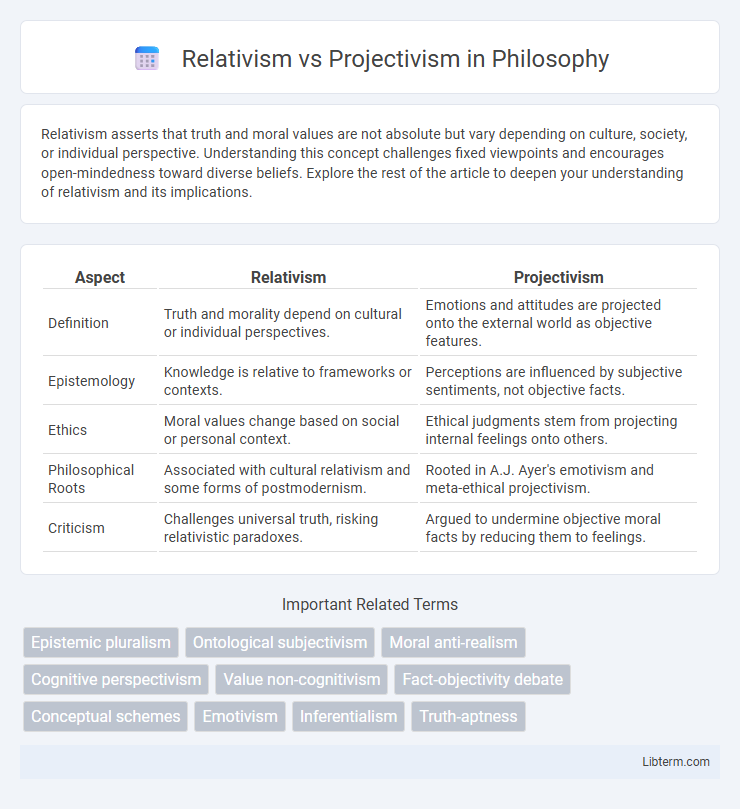Relativism asserts that truth and moral values are not absolute but vary depending on culture, society, or individual perspective. Understanding this concept challenges fixed viewpoints and encourages open-mindedness toward diverse beliefs. Explore the rest of the article to deepen your understanding of relativism and its implications.
Table of Comparison
| Aspect | Relativism | Projectivism |
|---|---|---|
| Definition | Truth and morality depend on cultural or individual perspectives. | Emotions and attitudes are projected onto the external world as objective features. |
| Epistemology | Knowledge is relative to frameworks or contexts. | Perceptions are influenced by subjective sentiments, not objective facts. |
| Ethics | Moral values change based on social or personal context. | Ethical judgments stem from projecting internal feelings onto others. |
| Philosophical Roots | Associated with cultural relativism and some forms of postmodernism. | Rooted in A.J. Ayer's emotivism and meta-ethical projectivism. |
| Criticism | Challenges universal truth, risking relativistic paradoxes. | Argued to undermine objective moral facts by reducing them to feelings. |
Understanding Relativism: A Conceptual Overview
Relativism asserts that truth and moral values depend on cultural, social, or individual perspectives, emphasizing the variability of beliefs across different contexts. This philosophical stance challenges absolute or universal standards by positing that what is true or right is relative to a particular framework or viewpoint. Understanding relativism requires recognizing its implications for ethics, epistemology, and cross-cultural communication, where norms and truths are seen as contingent rather than fixed.
Projectivism Explained: Foundations and Key Ideas
Projectivism in metaethics holds that moral properties are not objective features of the world but projections of an observer's attitudes or emotions. Founded on the works of philosophers like A.J. Ayer and Simon Blackburn, it asserts that ethical statements express subjective feelings rather than factual claims. This approach challenges moral realism by emphasizing the psychological basis of moral judgment and the role of human sentiment in shaping ethical discourse.
Historical Development of Relativism and Projectivism
Relativism emerged prominently in the 20th century through the works of philosophers like Friedrich Nietzsche and later, cultural anthropologists emphasizing the variability of truth and morality across cultures. Projectivism, closely associated with 20th-century philosopher A.J. Ayer and his emotivist theory, advanced the idea that moral judgments are projections of individual attitudes rather than objective facts. The historical development of relativism centers on its challenge to universal truths, while projectivism grew from analytic philosophy's focus on language and meaning in ethical expressions.
Relativist vs Projectivist Approaches to Truth
Relativist approaches to truth hold that truth is context-dependent, varying according to cultural, linguistic, or individual perspectives, emphasizing that no absolute or universal truth exists. Projectivist perspectives argue that truth attributes are projections of human attitudes or emotions onto the external world, suggesting that truth does not reflect objective reality but rather subjective mental states. These contrasting views highlight key debates in epistemology and meta-ethics about whether truth is an inherent property or a subjective construction.
Moral Judgments: Relativist and Projectivist Perspectives
Relativist perspectives on moral judgments assert that ethical truths depend on cultural or individual frameworks, emphasizing context-specific norms and values. Projectivist views suggest that moral judgments express emotional attitudes projected onto the world, rather than objective features, highlighting the subjective nature of moral evaluations. Both frameworks challenge absolute moral realism by underscoring the variability and subjectivity inherent in ethical reasoning.
Objectivity and Subjectivity in Relativism and Projectivism
Relativism asserts that truth and morality are dependent on cultural, social, or individual perspectives, emphasizing subjectivity where objectivity varies between contexts. Projectivism, particularly in metaethics, views our moral judgments and values as projections of internal attitudes rather than objective facts, highlighting the subjective origin of evaluative discourse. Both theories challenge traditional objectivity by attributing truth and moral meaning to perspectives or internal states rather than independent, universal standards.
Criticisms and Challenges Facing Relativism
Relativism faces significant criticisms for its inability to provide a stable framework for truth, often leading to logical contradictions and moral paralysis. Critics argue that relativism's rejection of objective standards undermines meaningful cross-cultural dialogue and ethical accountability. Challenges also include its susceptibility to self-refutation and difficulties in addressing conflicts where competing perspectives are equally asserted.
Projectivism Under Scrutiny: Strengths and Weaknesses
Projectivism asserts that moral judgments project subjective attitudes onto the world rather than describe objective facts, explaining variability in ethical opinions across cultures. This approach strengths include its ability to account for emotional engagement and the dynamic nature of moral discourse without requiring absolute moral truths. However, weaknesses involve challenges in addressing moral disagreement, as projectivism struggles to justify normativity and resolve conflicts when attitudes differ fundamentally.
Real-World Applications: Relativism vs Projectivism
Relativism often informs cultural sensitivity in global ethics by emphasizing the context-dependent nature of moral values, allowing policies to respect diverse societal norms. Projectivism, frequently applied in psychology, explains how individuals attribute their own emotions or attitudes onto others, impacting interpersonal communication and conflict resolution strategies. In legal studies, relativism supports pluralistic frameworks, while projectivism aids in understanding witness biases during testimonies.
Conclusion: Navigating Between Relativism and Projectivism
Navigating between relativism and projectivism requires balancing the recognition of diverse perspectives with the acknowledgment of subjective projection in shaping moral judgments. Emphasizing situational context alongside understanding inherent cognitive biases enhances ethical discourse and practical decision-making. This approach fosters a nuanced framework that accommodates pluralism without abandoning critical evaluation of moral standards.
Relativism Infographic

 libterm.com
libterm.com